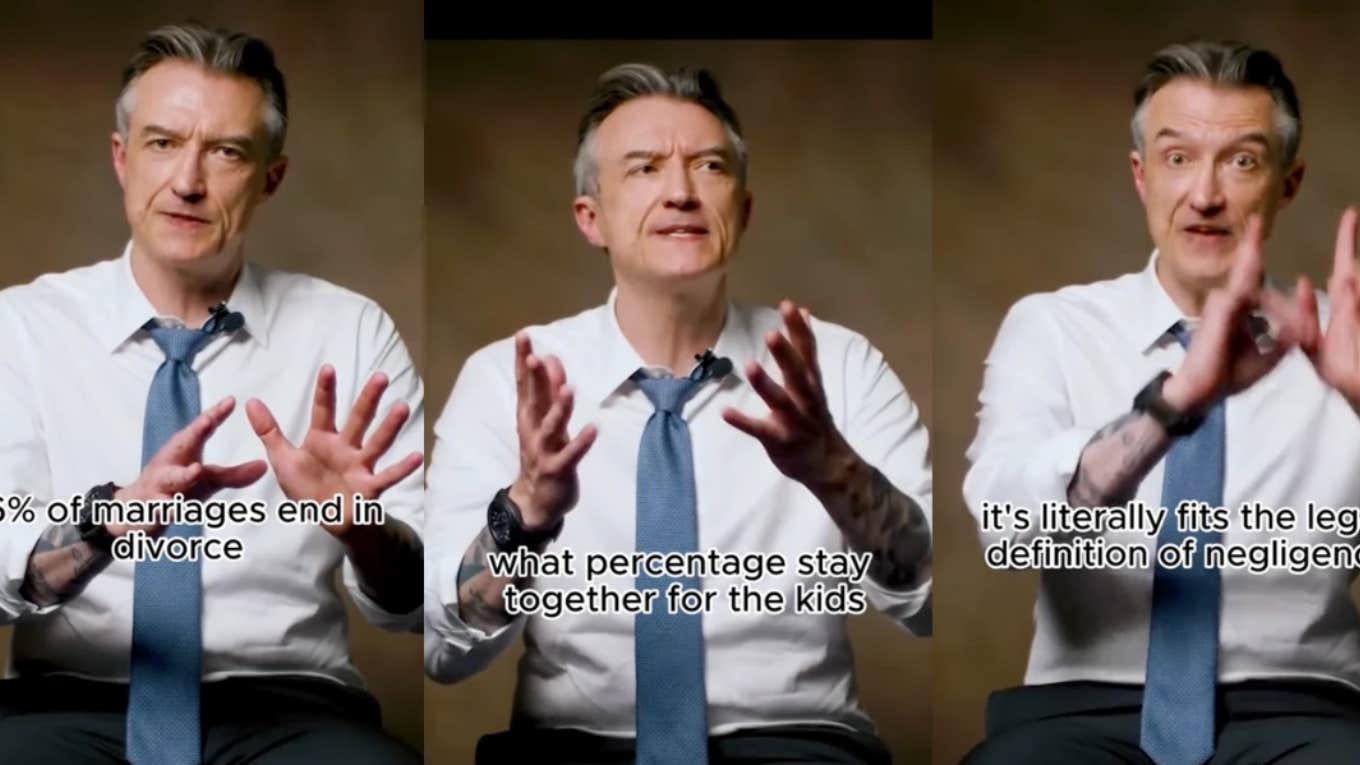Divorce Lawyer Explains Why Marriage Doesn't Really Make Sense Anymore — 'It Literally Fits The Legal Definition Of Negligence'
Marriage falls short of legal standards for risk of harm applied to practically everything else in life. So why do we keep doing it?
 @welovethatquote / TikTok
@welovethatquote / TikTok Here's a question to ponder — if you knew a certain product or service failed at least half the time, would you still be willing to take the chance? What if the risk were even higher? Say more like 75%?
That's the question one attorney suggests we should all be applying to one of, if not the, most important institutions in our lives and culture: marriage.
The divorce lawyer says that marriage doesn't make sense.
Lawyer James Sexton, a divorce attorney for 20 years, recently spoke to the inspiration and motivation TikTok channel @welovethatquote about the matter. And it's hard to come away from his analysis without feeling that it's high time we start reconsidering our perception of marriage as sacred.
"If you break it down, fundamentally, 56% of marriages end in divorce," Sexton says in the video, before pointing out the part of that equation most of us probably don't often consider — that's just the couples who actually go through with the costly, tedious and emotionally devastating process of divorcing.
What about all the other married people who stay together "for the kids or because they don't want to give away half their [stuff]?" as Sexton put it. He estimated this to be "20% at least," before going to analogize marriage to a technology product. "You now have a technology that fails 76% of the time. That's insane."
Sexton explained that marriage doesn't even meet basic standards for negligence applied to practically every other part of life.
Sexton then said, "If I told you there's a 76% chance when you walk out the door today, you're going to get hit in the head with a bowling ball, you would not go out, or you'd wear a helmet." Pretty hard to argue with him there.
It's for this reason, that he says marriage "literally fits the legal definition of negligence," because it falls short of a key standard legal professionals use for assessing risk: the Burden, Probability and Loss analysis, which is used to determine whether "what you lose by not doing something is lower than the risk of harm.
Held to this standard, Sexton says "Marriage is an inherently negligent activity. It's like owning a lion. The likelihood of someone getting hurt seriously is very, very high."
Given this it's not just that marriage doesn't make sense — our cultural obsession with it doesn't either.
We definitely wouldn't leave the house if we knew there was a 76% chance of taking a bowling ball to the cranium. Yet we have no such hesitations with marriage — not only do people continue to do it, but as Sexton points out, "there's a presumption that you should get married, and if you don't get married, there's something wrong with you."
Put in these stark terms, it's hard not to wonder why we're like this. Religion plays into it, of course, as do issues like legal benefits and entitlements, from tax breaks to parental rights (especially for LGBTQ+ people) to access to healthcare — in fact, a 2020 survey found that 26% of people who got married in 2020 did so to get on their partner's health insurance.
But those issues aside, it's hard not to feel like Sexton has a point about the ways marriage just... doesn't make any sense. And he suggested we should probably be changing how we treat this topic culturally. Instead of reflexively celebrating the idea of marriage, perhaps we should be asking couples harder questions, like "why? You're happy? Why would you get married...why would you put yourself through that? Why would you run that risk?"
But of course, we humans are pretty terrible at applying logic and math to matters of the heart — even Sexton himself. After 20 years spent helping couples get out of their marriages, "I still get misty-eyed at weddings," he said. "There's something in me that goes, like, maybe it'll work out for these two."
Statistics show that divorce was actually declining for a decade — but America still has among the highest divorce rates in the world.
Perhaps contrary to perception, the divorce rate in America actually declined for 10 consecutive years from 2011 to 2021 according to data gathered by the US Census Bureau. But of course, a lot has happened since the last census in 2020 — namely a global pandemic and the myriad stories we've all heard about that upheaval spiking the divorce rates are not just tall tales.
According to the legal industry trade publication Daily Business Review, the spike in divorce cases has been so steep and so sustained since 2020 that family law practices are struggling to hire enough lawyers, especially as divorce cases have become even more acrimonious since the pandemic.
Sexton's 56% statistic is a bit higher than many official estimates, which place the American divorce rate between 40% and 50%. But still, even with the most optimistic view of the institution's failures, it's not only hard to argue against Sexton's suggestion that marriage doesn't make much sense — it's apparently getting harder every year.
Still, with so many legal rights and benefits inextricably tied to the institution of marriage, it's unlikely to go away any time soon. But it certainly seems like it's long past time to start rethinking all that.
John Sundholm is a news and entertainment writer who covers pop culture, social justice and human interest topics.

